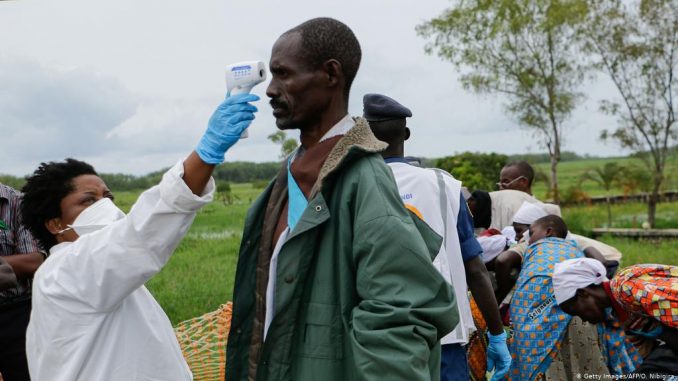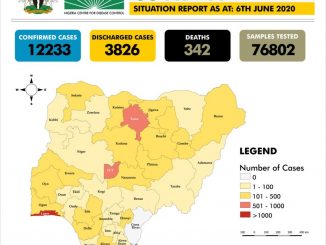
The World Health Organisation (WHO) has said that the coronavirus pandemic is slowing in Europe, while its new study warned the virus could kill 150,000 in Africa over the next year unless “urgent action” is taken.
In its modelling study, WHO projects 231 million infections in Africa, as nearly 4.5 million COVID-19 cases have been confirmed worldwide, while the number of fatalities reached another grim milestone.
It said Brazil registers a daily record of nearly 14,000 new COVID-19 cases, China marks one month without any new confirmed infection.
Below are the WHO updates on COVID-19
A WHO modelling study says the novel coronavirus could infect around 231 million people in Africa and kill 150,000 over the next year unless “urgent action” is taken. The study modeled likely rates of exposure to the virus in 47 African countries based on factors including population density and containment measures.
Although researchers said many African nations have swiftly taken containment measures, poor health systems could quickly be overwhelmed if containment fails. They called for countries to rapidly increase healthcare capacity, particularly in primary hospitals, DW reported.
The impact of COVID-19 on health care systems is also exacerbated in developing countries by the prevalence of other major health issues like HIV, tuberculosis, malaria and malnutrition, the study said.
ALSO READ: Boris Johnson eases lockdown, tells people to go back to work, in plan to restart UK economy
03:26 Germany has confirmed 913 new coronavirus cases, and 101 new deaths were reported, according to the latest figures from the Robert Koch Institute (RKI). The total number of cases is now at 173,152, and the death toll is 7,824.
This is how Friday’s figures compare to previous days:
Thursday, May 14: 933 new cases, 89 new deaths.
Wednesday, May 13: 798 new cases; 101 new deaths.
Tuesday, May 12: 933 new cases; 116 new deaths.
Monday, May 11: 357 new cases; 22 new deaths.
Sunday, May 10: 667 new cases; 13 new deaths.
03:09 Virologists and biochemists at Frankfurt’s Goethe University say they have identified a potential starting point for developing a drug to treat COVID-19.
In a study published in the international science journal Nature, the researchers said they were able to identify how SARS-CoV-2 infects cells. They also identified “small molecule inhibitors” that disrupt viral replication in cells by targeting cellular pathways the virus uses.
“Our results reveal the cellular infection profile of SARS-CoV-2 and led to the identification of drugs inhibiting viral replication,” said an abstract of the study.
Most of the substances tested in the study are parts of already existing drugs, and the researchers hope their work will expedite the search for viable medicines.
However, the efficacy of these substances in treating COVID-19 patients still needs to be determined in clinical trials.
02:51 China marks one month since it last reported a coronavirus death. The country’s National Health Commission reported four new cases on Friday. In total, China confirmed 82,933 cases and 4,633 deaths since the virus emerged in Wuhan. Only 91 people remain in treatment for COVID-19 in the country. While China has increasingly opened up its economy, authorities have maintained social distancing rules and a ban on foreigners entering the country.
02:12 COVID-19 patients who were given hydroxychloroquine, an anti-malarial drug, did not get better significantly faster than those not treated with the drug, two new studies published in the medical journal BMJ found.
The drug had been touted by US President Donald Trump as a game-changer in its potential to cure COVID-19, which boosted demand for it in early April.
While the drug is still widely being used in the US, and in other countries as a potential treatment for the coronavirus disease, the US Food and Drug Administration has warned against its use outside of hospitals and clinical trials due to the risk of side effects, including heart problems.
01:53 Mexico has confirmed 2,409 new coronavirus cases, the country’s health ministry said, marking the biggest one-day rise since the pandemic began.
Mexico also reported 257 new deaths, taking the official tally to 42,595 infections and 4,477 fatalities. The latest figures come as the government appeared to push back by two weeks the date to reopen its auto industry after the lockdown.
00:39 The US added 1,754 coronavirus-related deaths in the last 24 hours, according to Johns Hopkins University, bringing the total to 85,813. The US is the hardest hit in terms of the number of COVID-19 deaths and infections.
The US has 1,416,528 confirmed cases.
00:02 US President Donald Trump’s Mar-a-Lago club in Florida will partially reopen to members this weekend as the state slowly begins to ease the coronavirus lockdown. The resort’s Beach Club restaurant, its pool, and its whirlpool will reopen on Saturday after two months, the club said in an email sent to members. It also said that members will have to practice social distancing and lounge chairs will be set 6 feet apart.
Trump’s private residence and the resort’s main building, which includes hotel rooms, will remain closed.
00:01 Brazil’s health ministry announced 13,944 new COVID-19 cases on Thursday — a new daily record for the second day in a row. On Wednesday, Brazil added over 11,000 cases in 24 hours. Brazil’s total number of cases is now at over 202,000. The death toll also rose by 844 to a total of 13,933.
Despite the skyrocketing number of cases, Brazil’s populist President Jair Bolsonaro is urging regional governments to open up the economy and remove movement restrictions, arguing a bankrupt economy will cost more lives than the virus.
“Many more will die if the economy continues to be destroyed,” Bolsonaro told Brazilian media, while warning of famine and “chaos” and saying lockdowns were “not the way.”
00:00 Catch up on yesterday’s coronavirus news here: Coronavirus latest: Pandemic slowing in Europe, WHO says
In reporting on the coronavirus pandemic, unless otherwise specified, DW uses figures provided by the Johns Hopkins University (JHU) Coronavirus Resource Center in the United States. JHU updates figures in real-time, collating data from world health organizations, state and national governments and other public official sources, all of whom have their own systems for compiling information.
Germany’s national statistics are compiled by its public health agency, the Robert Koch Institute (RKI). These figures depend on data transmission from state and local levels and are updated around once a day, which can lead to deviation from JHU.
Sources: Reuters, dpa, AFP, AP




